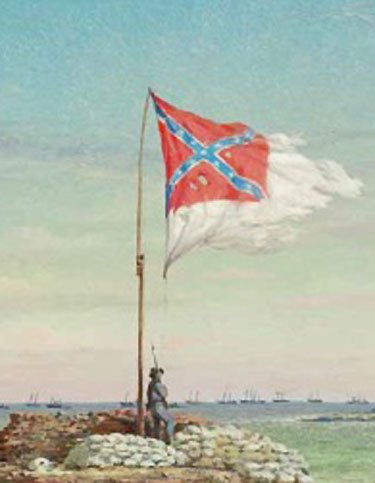
Detail, Conrad Wise Chapman, The Flag of Sumter, Oct 20 1863
At Medium, Jonathan Clark explains that the Civil War was not really fought to end Slavery.
Viewing the Civil War as a crusade to end slavery is simply not correct; abolitionists never accounted for more than a sizeable minority in the North. The cause of war in 1861 wasn’t slavery. It was about the loss of millions in tax revenues.
Lincoln ultimately annexed Abolitionism to the War in order to cover a war of conquest with a nobler justification and to make it harder for European countries to recognize or ally with the Confederacy.
“The Confederate soldier did not go to war to perpetuate slavery. Most of them never owned a slave, and our hero, Gen. Robert E. Lee, said that if he owned every one of the slaves in the South he would give them for the preservation of the Union. It was not for the slaves they fought, but for principle, for their homes and native land.â€
–T.F. Goode , Confederate Banquet, January 19, 1893.





pigpen51
I got into this very same discussion on a different blog awhile ago. I went into great detail with some other people who were very much certain that slavery was the only reason that the war was fought, based upon one paper written by the seceding colonies had written. I went into great detail, showing the before reasons such as financials and such, but they were very much angry about how it was just slavery. So you might be prepared for some feed back about how you are wrong. Just a heads up.
JDZ
I’m not sensitive.
Joe Y
There were and are many disagreements that divided North and South, before the war and after the war, but the only one that lead to war was slavery. One would have to completely ignore US history prior to the war not to see this. If Lee was being honest, he sure was quiet about it. I’m unfamiliar with him offering to accept his generalship only on the condition that the CSA free its slaves.
Otis
Civil wars are quite uncivil.
I would imagine the years running up to declaration of that war were like now. Discord and blame, hatred down between friends, family members and neighbors.
Manipulation by those in power because they were losing control.
Nori
Otis for the win.
And yes,it is always,ALWAYS about the money. Cui bono?
Mike-SMO
Stubborness.
The “gentry” in both the UK and in the South could not comprehend the new industral age. In the UK, the gentry were trapped in and among the new society. The states that would be the Confederacy saw the possibility of a physical separation from the un-cultured “Yankee” . Such secession made the Yankee vulnerable to foreign trade and military attack. The South saw an alliance in their peers in the UK, but the UK was already “half-Yankee” [industrial]. There were other sources of cotton for Britain that didn’t involve duels with the Yankee Navy. The War of 1812 wasn’t that long ago and I suspect that the Europeans were taken aback by the intensity of the land warfare in the “Civil War”. Napoleon had been nasty enough.
The Southern gentry could never conceive of a way to bring the power, independence, and profit of the modern age into a mesh with their established culture. Local industrial production would have made import tariffs mostly irrelevant. No one was going to war over the high price of European petti-coats or perfume. There was no foreign “Hun” to encourage cooperation within an intermingled population.
I appreciate the concept that the Civil War was the completion of the American Revolutionary War. Slavery provided an emotional focus that drove the blood shed that was triggered by secession.
JK Brown
I recently read Lincoln’s speech at a sanitary fair, in Baltimore, April 1864. I was looking for the paragraph on liberty, but was surprised by the following:
“When the war began, three years ago, neither party, nor any man, expected it would last till now. Each looked for the end, in some way, long ere to—day. Neither did any anticipate that domestic slavery would be much affected by the war. But here we are; the war has not ended, and slavery has been much affected—how much needs not now to be recounted. So true is it that man proposes, and God disposes.”
Note the “Neither did any anticipate that domestic slavery would be much affected by the war.” That’s a revealing on the issue of slavery.
http://teachingamericanhistory.org/library/document/address-at-a-sanitary-fair/
Frank
A good analogy is people today who say that the middle east wars are about oil. Oil IS a major factor: it affects the world economy, it finances terrorism, and it makes the entire region important. But to say those involved are just fighting over oil disrespects the people involved, just as saying the civil war was about slavery disrespects all the other causes involved.
ruralcounsel
It’s no wonder that so many are so sure that the basis for the war was slavery and they reject the possibility of others. It is the predominant self-congratulatory story told by the victors after a disastrous bloodletting. It would have been political suicide to admit that it was mostly for money and dominance. Not that slavery wasn’t a facet of the economic environment that both North and South found themselves in, which makes it difficult to separate out. But it’s clearly the moral highground afterthought seized upon by the winners.
Please Leave a Comment!